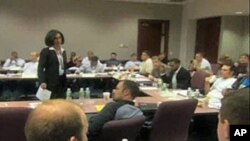Professional athletes in the United States can make millions of dollars throughout their careers. Yet statistics show that many eventually run out of money once their playing days are over. The University of Pennsylvania’s Wharton Business School and the National Football League are out to change that. They've teamed up to teach professional athletes how to rebuild their lives when their sports careers come to an end.
“The average career span of an NFL player is 3.5 years," says Morvarid Taheripour, a professor who helped form what's now called the Business Management and Entrepreneurial Program. "So the amount of the time they can be a professional football player with respect to the rest of their lives is quite short.”
The average professional athlete’s career is over by age 33. For physically-demanding sports, like American football, it's as young as 28. Deciding what comes next can be difficult.
"All their life they have focused on being the best football player they can be, so now we help them figure out 'How can I do something else?'" says Kenneth Shropshire, Taheripour's colleague at the University of Pennsylvania’s Wharton Business School. "Some people say athletes die two deaths. You kind of die when you stop playing and you die in real life. So they've got to come back to life and figure out 'How am I going to make a living at 25 for maybe another 40 years?'"
For Taheripour, who came to the US from Iran as a child, the partnership with the NFL is a dream come true. "It was taking everything I love about teaching and yet being able to impact people who are both accomplished and are incredibly driven, yet very humble."
Driven, rich and young can be a bad combination. And even with help, figuring out the next chapter isn't easy. Tony Stewart, a recent graduate of the program, retired from the NFL just a few months ago.
"There's a statistic that says 78 percent of professional football players are bankrupt, divorced or unemployed two years after leaving the game," says Stewart. "To me, that's just not acceptable. When it's time, when it's over, you have to have a plan."
Some 220 athletes have gone through the program over the past six years.
"They are like sponges. Everything we tell them, they can't get enough, honestly," says Taheripour. "Many guys come in and say, 'You know, I want to make a difference and I want to be known for something besides the number on my jersey. I just need to know how.'"
Darwin Walker is one former student who avoided being a statistic. Today, he runs a number of successful businesses and credits football for his accomplishments.
"The concepts I learned about leadership have all come from playing the game of football," says Walker. "The amount of study, amount of commitment, and time that you have to put into it is very much like being a successful business person."
Shifting the skills learned on the field to the workplace seems natural to some, but the numbers show that's not the case for everyone. Taheripour's message to her students is a serious one.
This is the time to build your legacy, she tells them, because no matter how long your athletic career lasts, you are so much more than just an athlete.












